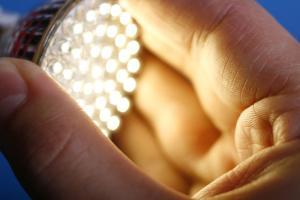Over the last few years, LED lights have become very popular in India. LED lights are widely used in our country, both indoors and outdoors because they use lesser electricity and hence are easy on the pocket

A recent study published by French Agency for Food, Environmental and Occupational Health & Safety (ANSES) revealed that the "blue light" in LED lighting can damage the retina (back of the eye) and disturb natural sleep rhythms. The report also claims that long-term exposure to LED lights can accelerate the ageing of retinal tissues, leading to an early onset of Age-related Macular Degeneration (AMD). As the name suggests, AMD is a degenerative disease that affects the macula (centre part of the retina), causing irreversible vision loss.
ADVERTISEMENT
Over the last few years, LED lights have become very popular in India. LED lights are widely used in our country, both indoors and outdoors because they use lesser electricity and hence are easy on the pocket. In fact, LED lights are all around us – in our mobile, TV and laptop screens.
While there is a need for more conclusive data to confirm the link between LED lights and AMD, medical experts claim the risk cannot be ruled out.
Dr. Ajay Dudani, CEO of Bombay Retina Centre, Mumbai says “It is true that excessive use of blue light from the screen and mobile phones is harmful to the eyes, affecting the macular region of retina, which leads to age-related macular degeneration (AMD). Hence, it is advised to use mobile phones on night mode at night and prefers keeping the brightness to minimum during the day. Also, avoid using mobile phones in a jet dark room”.
LED uses only a fifth of the electricity compared to a yellow bulb for brightness. To produce white light a short wavelength LED like blue or ultraviolet with a yellow phosphor coating is combined. The research further states that if the light is white or colder, the proportion of blue in the spectrum is greater, which accelerates the ageing of retinal tissues and can lead to AMD.
AMD is one of the key causes of vision loss in the elderly population. AMD constitutes 8.7% of blindness in the world and the blind population in India is about to rise to 15 million by 2020.
Symptoms of AMD include blurred or fuzzy vision, straight lines that appear wavy or crooked, decreased contrast or colour sensitivity, difficulty in seeing from a distance, a small but growing blind spot in the centre of vision. There is no cure for AMD but there are treatment options available in India which include laser surgery, anti-VEGF (Vascular Endothelial Growth Factor) injections and photodynamic therapy that can slow or halt its progression in some cases.
Early detection of AMD increases the possibility of preventing vision loss. Treatment can prove more effective if AMD is diagnosed early.
1. Majority of us spend an average of 10-15 hours every day on Mobile, TV and Laptop screens. The LED light emitting from these screen affects our eyes. People should take regular breaks while working on screens for a longer period and restrict their daily exposure to screens, to avoid the risk of AMD in the future
2. Focus on healthy eating habits. Include antioxidants like <insert examples> in your diet as they help maintain retinal health. Besides, adding green vegetables to the diet improves the health of the retina
Catch up on all the latest Crime, National, International and Hatke news here. Also download the new mid-day Android and iOS apps to get latest updates
 Subscribe today by clicking the link and stay updated with the latest news!" Click here!
Subscribe today by clicking the link and stay updated with the latest news!" Click here!






